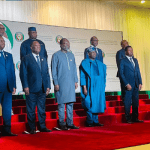The political landscape in West Africa has been recently shaken by the events unfolding in Niger. Following the military coup that ousted President Mohamed Bazoum’s government, the ruling junta has found itself at the center of a storm of regional and international condemnation.
The Economic Community of West African States (ECOWAS) and other neighboring regional blocs have swiftly imposed heavy sanctions on Niger, aiming to pressure the junta into restoring constitutional order. However, despite the mounting pressure, the junta’s steadfast stance raises important questions about the efficacy of sanctions in shaping political outcomes and the complex dynamics at play within the region. Wasiu Salami, TVC News Senior Executive, Digital Contents and Social Media writes on this development
ECOWAS Sanctions: A Regional Response
In response to the coup that occurred on [Date], ECOWAS, a regional organization comprising 15 West African nations, immediately condemned the overthrow of the legitimate government and suspended Niger’s membership. The organization, committed to promoting peace, stability, and development in the region, swiftly imposed a range of sanctions, including freezing the junta members’ assets, imposing travel bans, and imposing a trade embargo.
These sanctions were backed by other regional bodies, such as the African Union (AU), which suspended Niger’s membership, and the United Nations (UN), which expressed deep concern over the situation. The collective response from these organizations highlights the shared commitment to upholding democratic norms and constitutional order in the region.
The Junta’s Defiance
Despite the united front presented by ECOWAS and other regional blocs, the junta in Niger has shown a remarkable degree of defiance. The junta’s leaders argue that the coup was necessary to address the alleged corruption and mismanagement of the previous administration. They claim that they are committed to a swift return to civilian rule, but they want to first address the issues that led to their intervention.
The junta’s resilience could be attributed to several factors. First, history has shown that military juntas often view themselves as protectors of national stability and claim to be addressing systemic issues in governance. Second, the junta’s leaders might calculate that the sanctions, while painful in the short term, may not be sustainable for the long term, especially if they can secure support from other international actors.
Impact and Limitations of Sanctions
Sanctions are a commonly used diplomatic tool to pressure governments and entities to change their behavior. However, their effectiveness can vary significantly depending on the context. In the case of Niger, the junta seems to be banking on the idea that the economic and political costs of sanctions will be outweighed by the perceived benefits of their actions. Moreover, the junta may be exploring alternative sources of support from non-regional actors who might view them favorably.
Another challenge with sanctions is that they can have unintended consequences for the civilian population, often hitting the most vulnerable the hardest. Economic difficulties caused by trade embargoes and financial freezes can lead to food and medicine shortages, impacting the very people these sanctions aim to protect.
The Way Forward
The situation in Niger underscores the complexity of international responses to political crises and highlights the limitations of sanctions in achieving desired outcomes. While ECOWAS and other regional organizations are right to condemn and take action against unconstitutional changes of power, it’s important to consider broader strategies that not only hold those responsible accountable but also prioritize the well-being of the people.
A comprehensive approach might involve diplomatic negotiations, mediation efforts, and clear benchmarks for the junta’s return to civilian rule. Engaging with international partners to address the junta’s concerns about governance issues could also be beneficial in creating a path towards stability and democracy.
Conclusion
The ongoing standoff between the Niger junta and ECOWAS, along with other regional blocs, paints a complex picture of political dynamics in West Africa. While the regional response to the military coup reflects a commitment to democratic norms and constitutional order, the junta’s defiant stance and the limitations of sanctions cast a shadow of uncertainty over the situation.
The unfolding events in Niger serve as a reminder that political crises cannot be solved solely through punitive measures. A balanced and holistic approach, combining diplomatic efforts, mediation, and engagement with key stakeholders, will be crucial in steering the country toward stability, civilian rule, and lasting development.














